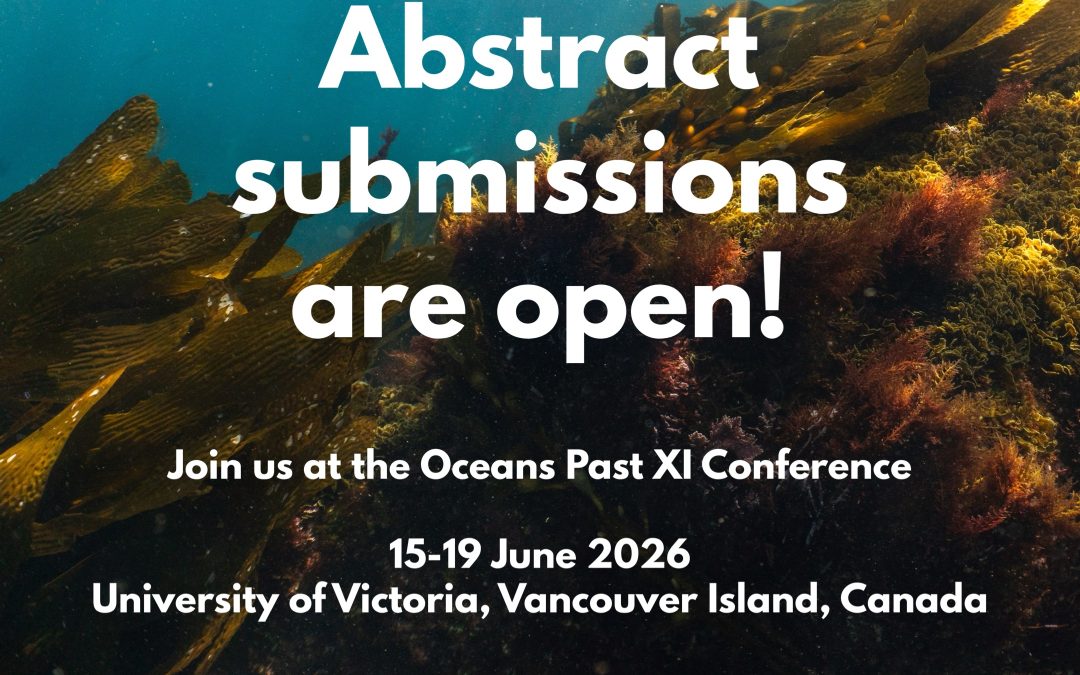Call for Abstracts and ECR funding award submissions is now open!
Deadline: 19 December 2025
The Oceans Past Initiative connects scholars and practitioners interested in documenting and understanding changes in marine systems and human-ocean interactions in past decades, centuries and millennia. The 11th Oceans Past Conference will be held at the University of Victoria on Vancouver Island, Canada from the 15-19 June 2026. We look forward to seeing you there. Registration will open in February 2026. Discounts will be available for OPI members, early career researchers and those from lower income countries.
Oceans Past XI themes
Select the one most closely related to your proposed topic:
- Trajectories of human influences on the seas: fisheries, pests, and pollution
- Indigenous ocean knowledges
- Connecting communities: blue memory, place, heritage, and justic
- Marine ecosystems past and future, from kelp forests to coral reefs
- Physical and biological change in marine systems
- Ocean stewardship and belonging
- The future past of marine paleobiology
- From collapse to recovery: Learning from our shared pasts to inform future policy and management
For more information, visit the conference website or contact us at info@oceanspast.org with any questions.
Travel Support Requests
Are you a student, or have you completed your Master’s or PhD within the last 5 years? You may be eligible for partial attendance support from the International Council for Exploration of the Sea (ICES). If so, add a request to your abstract submission for ECR monetary support, describing how an award will aid your attendance and benefit your research trajectory (max. 200 words). You must present your work at the conference to be eligible for an award. Awards will be available on a competitive basis and based on demonstrated need and the value to the applicant of attendance.
Abstract and Funding Award Submission
To qualify for an oral or poster presentation provide the following information to this form by 19 December 2025:
- Title of presentation
- Full name(s) and affiliation of all author(s)
- Email address of lead author/primary contact
- Abstract (max 200 words)
- Preferred presentation type [oral or poster]
- Preferred theme [select one from list]
- Additional information (optional)
- Are you considering in-person or online attendance at this stage? [note this information is for planning only and will not affect submission outcomes]
- Travel support request (optional): for current students and ECRs within 5 years of completing MSc or PhD only
- Year of award of most advanced degree
- Demonstrated need and benefit of monetary support (max 200 words)
- Institution / Employer and country
Related Articles
Announcing OPI XI: Vancouver Island, Canada 15-19 June 2026
Oceans Past XI: Coming in 2026Dear Members and Friends of the Oceans Past Initiative, We are delighted to announce the dates for our next conference, which will be hosted at the University of Victoria, Vancouver Island, Canada. Oceans Past XI: Ocean-connected...
Ancient Isotopes Reveal Pre-Lessepsian Invasions and Recent Overfishing in the Levant: Insights from Holocene Fish Remains
Ancient Isotopes Reveal Pre-Lessepsian Invasions and Recent Overfishing in the Levant: Insights from Holocene Fish RemainsIn our latest paper in the journal Mediterranean Marine Science, “Pre-Lessepsian isotopic niche spaces: using paleoecological proxies to assess...
Global Plate, Global Footprint: How the UK’s Seafood Habits Went Worldwide
What do your fish and chips say about global trade, overfishing, and climate impact? A new study published in Reviews in Fish Biology and Fisheries dives into how the United Kingdom’s appetite for seafood has dramatically expanded its global reach over the past 120...




